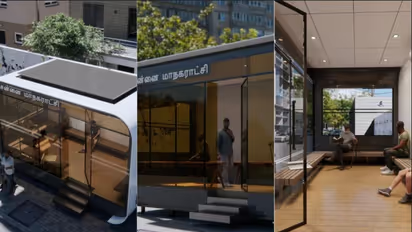Cool breaks, warm gesture: Chennai to build AC rest stops for gig workers across city

Synopsis
Chennai is set to launch India’s first air-conditioned rest areas for gig workers in key neighborhoods, offering toilets, seating, charging stations, and safety features—especially benefiting women in the growing delivery workforce.
In a groundbreaking move inspired by Dubai’s urban innovations, the Greater Chennai Corporation (GCC) is all set to roll out air-conditioned rest areas for gig workers across key neighborhoods in the city — a first-of-its-kind initiative in India’s public infrastructure landscape.
These rest spots, tailored specifically for delivery personnel in the food and e-commerce sectors, will come equipped with toilets, comfortable seating, mobile charging stations and parking bays. They will address the often-overlooked needs of the city’s ever-growing gig workforce. Areas like Anna Nagar, Nungambakkam, Royapettah, Mylapore, and T Nagar are among the first to be shortlisted for this urban upgrade.
The initiative stems from the growing visibility of gig workers on Chennai’s roads, often seen braving the scorching sun and sudden rains while racing against time and traffic. It’s an especially welcome step for women gig workers, who make up just 10% of the workforce, and often cite a lack of safe public spaces as a significant deterrent.
Also read: ED raids Gokulam Group offices in Kozhikode, Chennai over tax probe amid Empuraan controversy
“This project is as much about dignity as it is about comfort,” a GCC official said. “We want to ensure every worker has a place to rest, recharge, and feel safe — especially women, who face additional vulnerabilities on the job.”
While the vision is clear, the road to implementation isn’t without its bumps. In a city already dense with buildings and bursting at the seams with vehicles, identifying accessible yet non-congestive locations will be GCC’s biggest challenge.
Still, the model has promise. Dubai’s similar initiative has not only improved worker satisfaction but also contributed to better traffic flow and urban efficiency. Chennai hopes to replicate — and perhaps even outdo — that success by adapting the concept to its unique local needs.
Urban planners and social advocates alike have hailed the move as a progressive milestone in worker welfare, particularly for a sector that often operates in the shadows of the formal economy.
As the gig economy becomes a defining feature of modern urban life, Chennai’s cool, air-conditioned gesture sends a warm, resounding message: that every worker, no matter how fleeting their stops or how fast their deliveries, deserves a safe and dignified place to pause.
Also read: From Bangkok to Bodh Gaya: How PM Modi is weaving Buddhism into India's foreign policy
Stay updated with the Breaking News Today and Latest News from across India and around the world. Get real-time updates, in-depth analysis, and comprehensive coverage of India News, World News, Indian Defence News, Kerala News, and Karnataka News. From politics to current affairs, follow every major story as it unfolds. Get real-time updates from IMD on major cities weather forecasts, including Rain alerts, Cyclone warnings, and temperature trends. Download the Asianet News Official App from the Android Play Store and iPhone App Store for accurate and timely news updates anytime, anywhere.